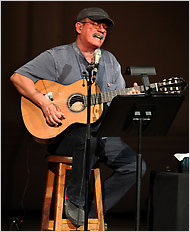
|  |  |  Entertainment Entertainment  
Silvio Rodríguez: A Cuban Folk Song Pioneer
 Jon Pareles - New York Times Jon Pareles - New York Times
go to original
June 07, 2010


| | Silvio Rodríguez: The Cuban singer at Carnegie Hall on his first United States tour in 30 years. (Richard Perry/New York Times) |  |
Outside Carnegie Hall on Friday night were knots of demonstrators, for and against the Cuban government. Inside was an uproar of adulation: repeated standing ovations, eagerly shouted requests, Cuban flags and banners unfurled, fervent singalongs, roses hurled onstage. The object of it all was a bespectacled, casually dressed man with a gentle voice and an acoustic guitar: Silvio Rodríguez, the 63-year-old Cuban songwriter who is making his first tour of the United States since 1980.

Mr. Rodríguez was a pioneer of Cuban nueva trova, which was part of the folky, literary, socially conscious songwriting movement that spread from South America (where it was called nueva canción, or new song) through the Caribbean in the 1960s. Nueva canción often drew on local traditions but emphasized lyrics over dance rhythms. On Friday Mr. Rodríguez sang “Carta a Violeta Parra” (“Letter to Violeta Parra”), a song from his most recent album, “Segunda Cita” (Sony/BMG Argent/Zoom), that praises Parra, a leader in Chilean nueva canción.

In some countries, like Argentina and Chile, nueva canción was a force of resistance from the left and was suppressed by right-wing governments. Although it sometimes hints at criticism, nueva trova drew support from the Cuban government. Mr. Rodríguez belonged to the Cuban Parliament for 15 years. In recent interviews he has said that he still believes in “the Revolution,” but that Cuba now also needs “evolution.”

Through the decades Mr. Rodríguez has become more poet than propagandist.

He sang about dreams, uncertainties, disillusionment, death, love and willful hope in lyrics that offered more ambiguities and yearnings than slogans. The music was lean and nearly transparent, arranged for guitars (including the Cuban tres), electric bass, flute or clarinet, and a drummer with a light touch.

Sometimes brisk, sometimes elegiac, the arrangements had undercurrents of Cuban bolero and guajira, with Mr. Rodríguez’s reedy high tenor always in the foreground. Through two dozen songs in a set that lasted nearly two and a half hours, the word “Cuba” was barely mentioned.

Mr. Rodríguez didn’t steer clear of politics. There was a stir when he dedicated “Canción del Elegido” (“Song of the Chosen One”), about an extraterrestrial transformed into a soldier, to the Cuban Five. They are Cuban intelligence agents imprisoned in the United States for spying on right-wing Cuban-exile groups in Miami; in Cuba they are heroes.

Mr. Rodríguez also sang “Sinuhé,” a plaintive waltz that imagines legendary figures — Sinbad, Ali Baba, Aladdin — wandering Baghdad after the United States bombings: “1,001 nights of fire and greed/1,001 nights without God or forgiveness.”

But more often the songs turned to the mythic and metaphorical: a lover’s kiss that brings the sunrise (“La Gota de Rocío,” or “Dewdrop”); being swallowed by a serpent that he destroys from within (“Sueño con Serpientes,” or “Dream With Serpents”); searching for a lost blue unicorn (“Unicornio”). His songs are full of seekers, trying to find inspiration, answers, love and causes worth fighting for.

Before encores he ended his set with “La Maza” (“The Mallet”). Over an insistent six-beat rhythm, an Argentine chacarera, Mr. Rodríguez sang about holding on to a sense of purpose. But it was phrased in conditionals and negatives: “If I did not believe in what I believe/If I did not believe in something pure.” The struggle was individual and internal, modest at its core.

Silvio Rodríguez will perform on Saturday in Oakland, Calif.; June 17 in Los Angeles; June 19 in Washington; and June 23 in Orlando, Fla. |

 |
|  |



